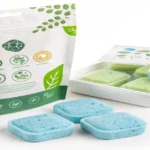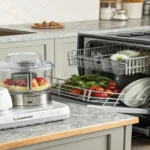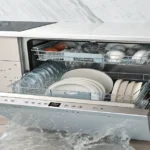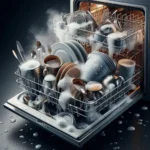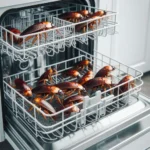Hey there! I’ll walk you through everything you need to know about what to do when your dishwasher backs up into the sink. Dealing with kitchen drainage issues is a regular occurrence for me.
Generally speaking, knowing the connection can save you a lot of trouble and money on plumbers.
The Hidden Connection: How Your Dishwasher and Sink Work Together
To begin with let me start with something you might not know: your dishwasher is a roommate with your kitchen sink. When I first learned that these two appliances have a common drain line, I was surprised.
This suggests that any change in one will surely impact the other. Imagine your dishwasher’s drain hose as a straw that connects to either the garbage disposal or to sink drain pipe.
Everything runs smoothly when things work! When a problem arises… That’s truly what we are here for.
Why Is My Sink Filling Up When I Run My Dishwasher?
We’ve all been there; you run your dishwasher and before you know it, your sink is attempting to turn into a kiddie pool!
Here’s what typically goes on: your dishwasher, when it drains, pumps out water very forcefully. If the shared drain line is showing even a little blockage, that water has no choice but to come upwards — straight into your sink!
Air (or in this case water) has to go somewhere – it’s literally like trying to blow through a straw that’s plugged on the other side.
The Top 5 Warning Signs Your Dishwasher Is About to Cause Trouble
Let me share the red flags I’ve learned to watch for:
- Standing water in your sink during or after running the dishwasher
- Weird gurgling noises coming from your drain (trust me, drains shouldn’t sound like they’re having a conversation)
- Water backing up into the sink when your dishwasher runs
- That unmistakable “rotten food” smell coming from either fixture
- Your sink taking forever to drain, even when the dishwasher isn’t running
My Go-To Solutions for Preventing Clogs
I’ve developed these habits over time, and they work:
| Prevention Tip | Why It Works | How Often |
|---|---|---|
| Run disposal first | Clears the path | Before each dishwasher cycle |
| Clean drain filter | Catches debris | Monthly |
| Hot water flush | Dissolves grease | Weekly |
| Scrape plates well | Prevents buildup | Every time |
DIY Fixes That Work (I’ve Tried Them!)
When you’re facing a clog, here’s what I recommend trying before calling in the pros:
- Pour boiling water down the drain (carefully!)
- Use the baking soda and vinegar trick (my personal favorite)
- Check and clean the air gap (that little chrome dome on your sink)
- Inspect the drain hose for kinks or blockages
“I’ve saved hundreds of dollars using these simple fixes before resorting to calling a plumber.” – My personal experience
When Should You Wave the White Flag and Call a Pro?
Look, I’m all for DIY solutions, but sometimes you need to know when to step back. Here’s when I call in the experts:
- If water starts backing up into multiple fixtures
- When you’ve tried everything and nothing’s working
- If you hear unusual sounds from your pipes
- When there’s a sewage smell that won’t go away
- If you notice water damage anywhere in your kitchen
The Garbage Disposal Connection: What You Need to Know
Here’s something I learned the hard way – your garbage disposal plays a huge role in this whole system. It’s like the gatekeeper for your drain system. I always make sure to:
- Run it regularly to keep things flowing
- Avoid putting fibrous foods down there
- Keep it clean with ice and citrus peels
- Run cold water while using it
Smart Maintenance Tips I’ve Learned Over Time
These habits have saved me from so many potential disasters:
- Monthly drain cleaning with natural cleaners
- Regular checks of the dishwasher filter
- Proper loading techniques (yes, it matters!)
- Using the right amount of detergent
FAQs
Q: How often should I really clean my dishwasher?
A: I do a basic clean monthly and a deep clean quarterly. Trust me, it makes a difference!
Q: Can I use Drano in my dishwasher drain?
A: I never recommend it – it can damage your pipes and dishwasher components. Stick to natural cleaners.
Q: Why does my sink gurgle when the dishwasher drains?
A: This usually means you’ve got air in the drain line, often due to a partial clog.
Key Takeaways (What I Want You to Remember)
- Always run your garbage disposal before starting the dishwasher
- Regular maintenance prevents most major problems
- Don’t ignore warning signs – they only get worse
- Natural cleaning solutions are often the safest
- When in doubt, call a professional
Pro Tips From My Experience
- Keep a plumber’s number handy (just in case)
- Take photos of your plumbing setup when it’s working well
- Mark your water shutoff valve locations
- Consider a water sensor alarm near your dishwasher
Final Thoughts
A kitchen plumbing system works like a team; if one player is not doing well, everybody suffers.
I’ve discovered that basic preventative steps can achieve great results in keeping things humming along. And if you ever have any issues, now you know exactly how to fix them!
If you abide by these tips and ensure your dishwasher is up to speed, there are few methods where the sink obstruct can be rendered due to that outlet.
That may seem like a lot to digest, but once you get your head wrapped around it — it’s all second nature. Believe me, your future self will love you for addressing these before they grow too far into a problem!

I’m Ian Welkins, a seasoned professional in the kitchen industry. My passion now drives me to provide invaluable insights into the world of top-notch kitchen products. With years of hands-on experience, I’m your go-to source for culinary excellence.



